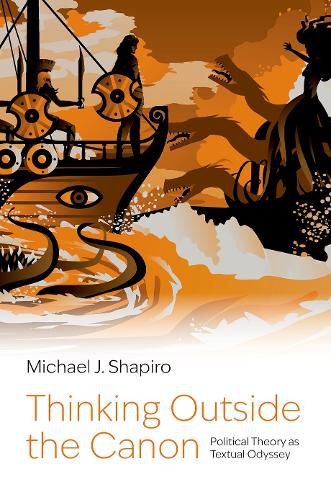Readings Newsletter
Become a Readings Member to make your shopping experience even easier.
Sign in or sign up for free!
You’re not far away from qualifying for FREE standard shipping within Australia
You’ve qualified for FREE standard shipping within Australia
The cart is loading…






Thinking Outside the Canon traces author Michael J. Shapiro's intellectual journey as a political theorist who has adapted multidisciplinary practices and unconventional texts across his career to develop a more diverse model of doing theory. Theorizing textuality and historiography, Shapiro draws on a variety of disciplinary idioms and texts that span across genres and geographies, ranging from Caribbean fiction to Ukraine war fictional ethnographies. As well, he covers an array of scales and spaces, from the state to the individual room. As such, Thinking Outside the Canon reflects how the field of political theory has grown and shifted through the author's own textual odyssey.
After recovering the early portion of his own political theory odyssey, Shapiro traces his departures from the canon. He recounts how, through this departure, he refashioned his scholarship via a series of textual engagements and composed the basis of an instructional inquiry focused on textuality and historiography. Finally, Shapiro relates how Thinking Outside the Canon functions as his own learning text, as both a theorist and writer and as a student, looking towards the future of the political theory canon and its usefulness.
$9.00 standard shipping within Australia
FREE standard shipping within Australia for orders over $100.00
Express & International shipping calculated at checkout
Thinking Outside the Canon traces author Michael J. Shapiro's intellectual journey as a political theorist who has adapted multidisciplinary practices and unconventional texts across his career to develop a more diverse model of doing theory. Theorizing textuality and historiography, Shapiro draws on a variety of disciplinary idioms and texts that span across genres and geographies, ranging from Caribbean fiction to Ukraine war fictional ethnographies. As well, he covers an array of scales and spaces, from the state to the individual room. As such, Thinking Outside the Canon reflects how the field of political theory has grown and shifted through the author's own textual odyssey.
After recovering the early portion of his own political theory odyssey, Shapiro traces his departures from the canon. He recounts how, through this departure, he refashioned his scholarship via a series of textual engagements and composed the basis of an instructional inquiry focused on textuality and historiography. Finally, Shapiro relates how Thinking Outside the Canon functions as his own learning text, as both a theorist and writer and as a student, looking towards the future of the political theory canon and its usefulness.